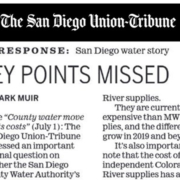U-T Publishes Response to Errant Story on Water Issues
The San Diego Union-Tribune on July 28 published and In Response article by Water Authority Board Chair Mark Muir that addressed a serious omission in a July 1 story about the cost of the regional water supply diversification strategy.
Said Muir: “Unfortunately, the story omitted clear-cut evidence that the region’s supply reliability strategy is an unqualified success: Our independent water supplies from the Colorado River are both less expensive and more reliable than supplies from the Metropolitan Water District of Southern California, which have been cut twice in the past decade by drought.”
Click here to read Muir’s published response. In addition, the paper has posted two corrections to the story.
However, the paper’s In Response format didn’t allow enough space to address other substantive problems in the July 1 story that the Water Authority had raised with the U-T.
For instance, the story inaccurately presented MWD’s water costs, which are actually about 30 percent higher than cited in the story because MWD adds substantial fixed charges on top of its volumetric charges, requiring additional calculations to arrive at a valid comparison with the cost of water from the Water Authority’s other sources.
“Clearly, Water Authority investments in more reliable supplies and large-scale infrastructure have contributed to higher local water rates, and we have never said otherwise,” said Muir in the article submitted to the U-T that was edited for space constraints. “However, no factor has had a bigger impact on wholesale treated water rates in our region since 2008 than rate increases imposed on us by MWD – a fact that would have helped readers understand the value of reducing reliance on MWD.”
The story also failed to serve readers by presenting Steve Erie as an objective, disinterested academic. In fact, Erie has been a paid consultant and expert witness for MWD in two major lawsuits against the Water Authority. Mr. Erie is entitled to his opinions and the U-T is entitled to print them – but the paper should have disclosed his business relationship with MWD, in which he was paid $250 an hour for his services.
Finally, it’s important to note that the story significantly undercounted the amount of water produced locally. In 2020, for example, the Water Authority expects the San Diego region will generate 39 percent of its supplies locally (not 30 percent, as the article said).
“Converted to gallons, that’s approximately the annual production of the drought-proof Claude ‘Bud’ Lewis Carlsbad Desalination Plant – a critical component of a successful, cost-effective strategy to support our region’s economy and quality of life,” Muir said.




